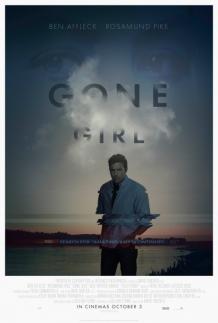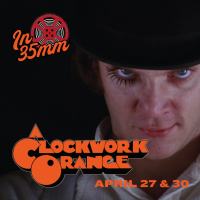“Gone Girl—David Fincher’s cold, cruel, and often very funny adaptation of Gillian Flynn’s bestselling novel—plays so many tricks at the viewer’s expense that it becomes difficult to take anything it does at face value. Ending exactly where it started, the movie traffics in flashbacks and backward twists that purport to reveal more and more about its dissatisfied central couple, but which only uncover facades.
“Gone Girl is a satire that doubles as tightly styled, perverse entertainment—a deconstructed thriller with a bop-bop-bop drum-machine pace. Fincher’s style—with its looming ceilings and motel-murder-scene lighting—can make something as simple as a man going out for a cup of coffee look like a procedural. Working off a script that correlates suburban home life with a convoluted mystery, he has made a movie in which the lurid and the mundane look exactly alike.
“Amy Dunne (Rosamund Pike) disappears from her suburban Missouri home on the morning of her fifth wedding anniversary. Her hapless husband, Nick (Ben Affleck), finds himself at the center of a media circus. While he hides out at the bungalow of his twin sister and business partner, no-nonsense local detective Boney rifles through his drawers and personal finances, uncovering a paper trail of bills, letters, and anniversary notes that suggest that he’s hiding something. Eventually, Nick is forced to seek out the services of Tanner Bolt, a charismatic lawyer who specializes in defending “wife-killers.” And still, there’s no body or definitive proof that Nick had something to do with his wife’s disappearance.
“Once a viewer accepts that Nick and Amy aren’t the people everyone else makes them out to be, they may begin to suspect that they aren’t the people they make themselves out to be, either. The more thoroughly the movie proves Nick's innocence, the harder it becomes for the viewer to trust him.
“This is where things get really tricky, because Gone Girl gives its audience plenty of reasons to think of Nick and Amy as archetypes. “That’s marriage,” declares Amy at the end of an especially brutal scene—a sharply delivered line that could be interpreted as a thesis statement for the movie, were viewers to believe that Amy is being sincere. But they can’t, which is more or less the point. Gone Girl is a movie about the way people assume established, familiar archetypes to please, manipulate, and entrap one another. The Dunnes’ behavior is predictable, but only because they are playing roles. The movie’s most tantalizing mystery is the question of what’s really going on in their heads. It remains unanswered.” - The AV Club
























